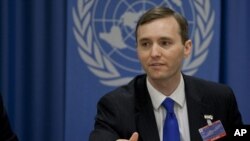The activists, non-governmental organizations and religious groups that work together through peaceful means to make their societies better and bring positive change are playing an increasingly important role in global affairs. Recognizing this impact, U.S. Secretary of State Hillary Clinton has elevated U.S. engagement with this part of society to be on par with U.S. engagement with foreign governments.
Senior Advisor on Civil Society and Emerging Democracies Dr. Tomicah Tillemann said this is a time of profound change: “We are seeing a renegotiation of many of the power relationships that have historically defined interaction between governments and citizens. The emergence of civil society as a defining force in international relations is part of that transformation. We want to make sure that State Department and the United States are keeping abreast of that change.”
Secretary Clinton launched the Strategic Dialogue with Civil Society in February 2011. Since that time, civil society representatives from around the world have contributed policy recommendations to the State Department. Through working groups, they focused on five key areas: governance and accountability; democracy and human rights; empowering women; labor issues; and religion and foreign policy.
“We’ve recognized that civil society organizations are not only influencing the agenda on these issues, they’re defining the agenda,” said Dr. Tillemann.
These representatives, members of the Obama administration, members of Congress and many others will come together May 16th, for the Strategic Dialogue with Civil Society 2012 Summit. The key focus, says Dr. Tillemann, will be the way that governments and civil society interact: “We focus primarily on policy and how we can make changes in the way we do business that will help civil society organizations be more effective in their work.”
The event will see the launch of diplomatic training programs that will facilitate engagement with civil society. It will also announce Embassy-level working groups in key countries that will continue the dialogue around the globe.
“We will be working to institutionalize forums for collaboration at the G-20 and other international multi-lateral meetings,” said Dr. Tillemann. This will help civil society bring their views into discussions of leaders from around the world and influence the international community’s thinking on key issues.
“It is in the interest of all sides,” said Dr. Tillemann, “To build a strong partnership.”
Strategic Dialogue With Civil Society 2012 Summit

Civil society groups are playing an increasingly important role in global affairs.



